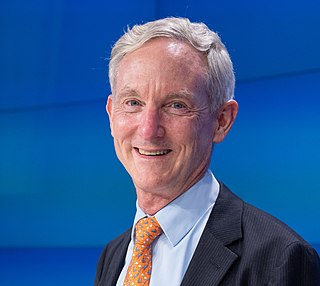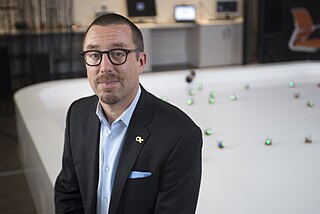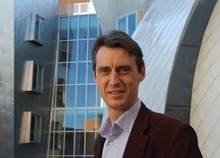
Robert Gray Gallager is an American electrical engineer known for his work on information theory and communications networks.

Jack Bonnell Dennis is an American computer scientist and Emeritus Professor of Computer Science and Engineering at Massachusetts Institute of Technology.

Frank Thomson "Tom" Leighton is the CEO of Akamai Technologies, the company he co-founded with the late Daniel Lewin in 1998. As one of the world's preeminent authorities on algorithms for network applications and cybersecurity, Leighton discovered a solution to free up web congestion using applied mathematics and distributed computing.

David A. Bader is a Distinguished Professor and Director of the Institute for Data Science at the New Jersey Institute of Technology. Previously, he served as the Chair of the Georgia Institute of Technology School of Computational Science & Engineering, where he was also a founding professor, and the executive director of High-Performance Computing at the Georgia Tech College of Computing. In 2007, he was named the first director of the Sony Toshiba IBM Center of Competence for the Cell Processor at Georgia Tech.

Michael Fredric Sipser is an American theoretical computer scientist who has made early contributions to computational complexity theory. He is a professor of applied mathematics and was the dean of science at the Massachusetts Institute of Technology.

Eduardo Daniel Sontag is an Argentine-American mathematician, and distinguished university professor at Northeastern University, who works in the fields control theory, dynamical systems, systems molecular biology, cancer and immunology, theoretical computer science, neural networks, and computational biology.

Avi Wigderson is an Israeli computer scientist and mathematician. He is the Herbert H. Maass Professor in the school of mathematics at the Institute for Advanced Study in Princeton, New Jersey, United States of America. His research interests include complexity theory, parallel algorithms, graph theory, cryptography, distributed computing, and neural networks. Wigderson received the Abel Prize in 2021 for his work in theoretical computer science. He also received the 2023 Turing Award for his contributions to the understanding of randomness in the theory of computation.
Thomas Lee Magnanti is an American engineer and Institute Professor and former Dean of the School of Engineering at the Massachusetts Institute of Technology.

Magnus B. Egerstedt is a Swedish-American roboticist who is the Dean of the Henry Samueli School of Engineering at the University of California, Irvine. He was formerly the Steve C. Chaddick School Chair and Professor at the School of Electrical and Computer Engineering, Georgia Institute of Technology.
Richard D. Braatz is the Edwin R. Gilliland Professor at the Massachusetts Institute of Technology known for his research in control theory and its applications to chemical, pharmaceutical, and materials systems.

Yann André LeCun is a Turing Award winning French-American computer scientist working primarily in the fields of machine learning, computer vision, mobile robotics and computational neuroscience. He is the Silver Professor of the Courant Institute of Mathematical Sciences at New York University and Vice-President, Chief AI Scientist at Meta.

Dimitri Panteli Bertsekas is an applied mathematician, electrical engineer, and computer scientist, a McAfee Professor at the Department of Electrical Engineering and Computer Science in School of Engineering at the Massachusetts Institute of Technology (MIT), Cambridge, Massachusetts, and also a Fulton Professor of Computational Decision Making at Arizona State University, Tempe.
Robert Kozma is First Tennessee University Professor of Mathematics at the University of Memphis.
Stephen P. Boyd is an American professor and control theorist. He is the Samsung Professor of Engineering, Professor in Electrical Engineering, and professor by courtesy in Computer Science and Management Science & Engineering at Stanford University. He is also affiliated with Stanford's Institute for Computational and Mathematical Engineering (ICME).
John N. Tsitsiklis is a Clarence J. Lebel Professor of Electrical Engineering with the Department of Electrical Engineering and Computer Science (EECS) at the Massachusetts Institute of Technology. He serves as the director of the Laboratory for Information and Decision Systems and is affiliated with the Institute for Data, Systems, and Society (IDSS), the Statistics and Data Science Center and the MIT Operations Research Center.

Panos Antsaklis is the H. Clifford and Evelyn A. Brosey Professor of Electrical Engineering at the University of Notre Dame and also Concurrent Professor in the Departments of Computer Science and Engineering and of Applied and Computational Mathematics and Statistics. He is a graduate of the National Technical University of Athens, Greece, and holds MS and PhD (1977) degrees from Brown University.
Daniel Mier Gusfield is an American computer scientist, Distinguished Professor of Computer Science at the University of California, Davis. Gusfield is known for his research in combinatorial optimization and computational biology.
Ioannis (Yannis) C. Paschalidis is a professor at Boston University with appointments in Electrical and Computer Engineering, Systems Engineering, Biomedical Engineering, and Computing & Data Sciences. He serves as the Director of the Center for Information and Systems Engineering.
Patrick Thiran is an electrical engineering professor at École Polytechnique Fédérale de Lausanne, who was named Fellow of the Institute of Electrical and Electronics Engineers (IEEE) in 2014 for contributions to network performance analysis.

The Louvain School of Engineering or École polytechnique de Louvain (EPL) is a faculty of the University of Louvain, Belgium, founded in 1864. Known as the Faculty of Applied Sciences prior to 2008, it currently operates on the campuses of Louvain-la-Neuve and UCLouvain Charleroi.












